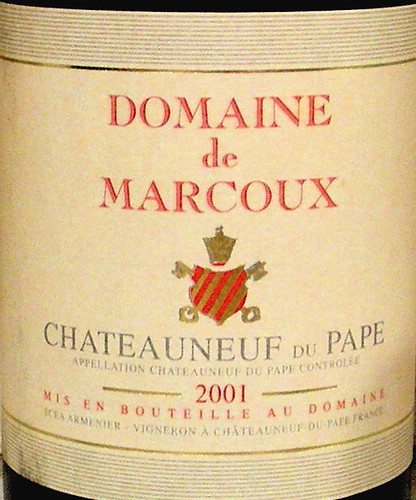According to biodynamics, a farm as a whole is an organism that should be self-sustainable as well as healthy balanced in order to control pests and diseases. Earth and plant life have their own rhythms in respect to their position to the moon, sun and stars. Therefore, in order to enhance these rhythms, the work in the fields and the cellars takes into account the different phases of the solar and lunar cycles. Furthermore, specific field preparations are made to stimulate hummus formation, such as manure stuffed into the horn of a cow to be buried in autumn, or crushed powdered quartz stuffed into the horn of a cow to be buried in spring.

Weathercock showing astronomic symbols at Domaine de Marcoux
Philippe Armenier is now a biodynamic consultant in California but Philippe's sisters, Sophie and Catherine Armenier, are now efficiently running the 17.5 ha estate planted mostly with Grenache, Syrah, Mourvèdre, and Cinsault. It's a family affair: the domaine has been run by the Armenier family since the 1300's.
 The wine we drank tonight was the 2001 Châteauneuf-du-Pape Domaine de Marcoux. It had a deep red core, a light brick color on the trim, and a spicy and peppery nose. The palate was lush, full-bodied, and juicy with sweet berries aromas, leaving a finish of bitter cocoa powder. We drank this biodynamic wine in honor of the 29th edition of Wine Blogging Wednesday, hosted this month by Jack & Joanne from Fork & Bottle.
The wine we drank tonight was the 2001 Châteauneuf-du-Pape Domaine de Marcoux. It had a deep red core, a light brick color on the trim, and a spicy and peppery nose. The palate was lush, full-bodied, and juicy with sweet berries aromas, leaving a finish of bitter cocoa powder. We drank this biodynamic wine in honor of the 29th edition of Wine Blogging Wednesday, hosted this month by Jack & Joanne from Fork & Bottle. I am not sure of the differences between organic and biodynamic wines but I am certain of one thing: I haven't found any bad biodynamic wine yet.
Technorati tags:: wine food & drinkwine blogging wednesday wbw wbw29
1 comment:
Sounds like a delicious wine and I like that weathercock!
Post a Comment